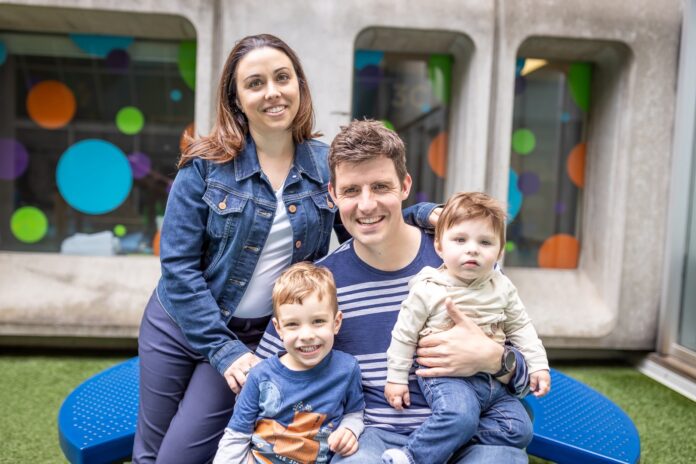
Like most babies, Nathan Bonner had his tiny foot pricked to collect a drop of blood when he was just a day old, as part of routine newborn screening. The test came back with a screen positive result for a metabolic disorder called phenylketonuria (PKU). Nathan was referred to Hamilton Health Sciences’ McMaster Children’s Hospital (MCH), one of five hospitals in Ontario with a newborn screening program, for follow-up care.
A genetic counsellor shared the screening results when he was just six days old. That same afternoon, the family went to MCH’s Genetics & Metabolics Clinic for further testing and confirming diagnosis.
With PKU, Nathan’s body is unable to break down an amino acid called phenylalanine. Without immediate discovery and treatment, infants can develop rashes, seizures and permanent brain damage. With early diagnosis and treatment, babies with PKU have normal development like their peers.
“We were in shock, but we felt like we were in good hands from day one,” says Nathan’s mom Stephanie.
A restricted diet, daily tracking and weekly blood work
The main treatment for PKU is a very restricted diet that Nathan will have to continue for the rest of his life to prevent brain damage from built-up phenylalanine.
“Treatment involves eliminating all high protein foods, tracking protein intake daily, and including specialized metabolic formula to support normal growth and development,” says registered dietitian in the Genetics & Metabolics clinic, Amy Pender.
“Patients like Nathan complete weekly blood work to monitor and adjust the diet to ensure that levels are in a safe range to prevent serious health issues.”
With PKU, Nathan can’t eat regular sources of protein, including bread, pasta and rice. Instead, phenylalanine-free PKU formula will be a life-long part of Nathan’s diet to meet his protein needs.
Mealtimes involve a ton of planning. Nathan’s food gets weighed before every meal and any food left behind, so his parents can keep track of exactly what he’s consuming.
The team at MCH help his parents understand options through education and monitoring.
More staff means kids can access the care they need, faster
Since the launch of MCH’s newborn screening program in 2006, the number of conditions screened for has grown significantly from two to around 30. The number of infants referred to MCH with positive results has also grown. MCH now provides follow-up care to about 150 babies with positive results annually, out of 25,000 babies born within the region each year.
Less than one per cent of babies receive a positive newborn screening result. Each of these kids can have different conditions. When they receive a patient referral, staff work with doctors from the appropriate hospital clinics, such as metabolics, respirology, endocrinology, hematology or immunology, depending on what condition the baby was
diagnosed with.
Thanks to government funding, MCH’s has added a nurse, dietetic assistant, genetics assistant, and social worker to this team. This additional support means infants receive timelier follow-up for diagnostic testing, and earlier treatment for those who go on to have a diagnosis confirmed.
Allison Pottinger is the new dietetic assistant, helping over 250 patients with different life-saving metabolic diets requiring close management.
Pottinger’s role includes ordering specialized metabolic formulas and foods; communicating information to patients; requesting and calculating a patient’s food record so the team has accurate data to adjust care plans as needed; and sharing resources with families about specialized diets.
Registered nurse Rebecca Carpenter also joined the clinic. She facilitates diagnostic testing for newborns; cares for patients during their appointments and manages treatment plans; educates families about metabolic disorders; and provides emotional support.
Patient advocacy is also a huge part of Rebecca’s role, including applying for funding, facilitating referrals, and working with schools and workplaces to accommodate a patient’s needs. This involves working with other health care professionals, advocating for policy changes, and empowering families to become advocates for themselves.
Every body is different
“We worry about when he goes to school and the social aspects of growing up,” says Ashley.
To the health-care team, the small joys are important. Pottinger has been working on a list of low protein foods available in local grocery stores and food options that can be used for special occasions, like pizza day, while fitting within the PKU diet for children like Nathan.
While PKU is a lifelong condition, there is a medication treatment that may or may not work when used in conjunction with the PKU diet.
“We hope to trial this treatment with Nathan in the coming months,” says Pender.
Stephanie and Ashley’s main goal is for Nathan to feel comfortable and confident.
“We hope he has the confidence to feel like himself,” says Ashley. “The fact that there’s investment in this area and that we have support is just awesome. We’re just so thankful for that.”

